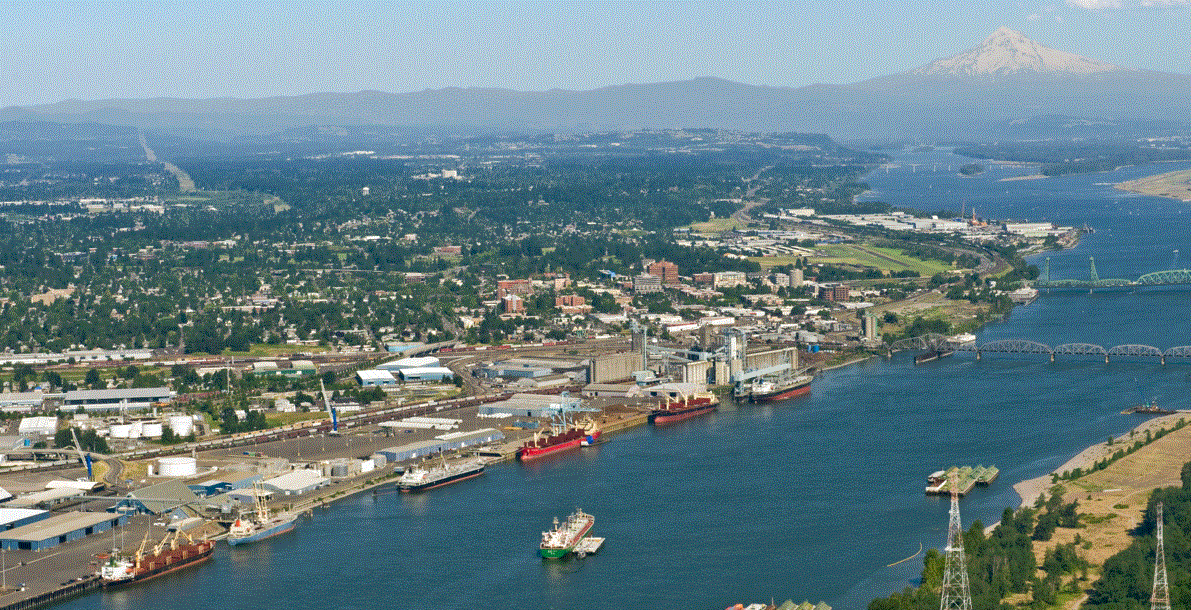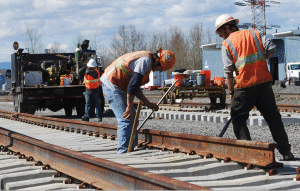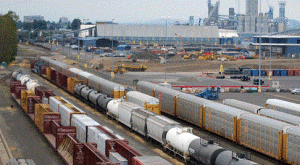
The recent decision by the Vancouver Port Commission to extend the lease with Vancouver Energy was appropriate and welcome. The Bakken oil fields of North Dakota are producing more than a million barrels a day of crude oil. This enormous energy reserve must get to market somehow. The Obama administration made the ideologically driven decision to cancel the Keystone Pipeline, which would have helped service the Bakken fields, and in doing so signaled to the industry that any other major pipeline proposals – and anything big enough to service the Bakken is a major pipeline – wouldn’t be welcomed by the Obama administration. The argument is that such a pipeline would be “too dangerous.” Never mind the 2.5 million miles of pipeline already safely existing in the USA.
The result of this insanity is that an enormous amount of oil still needs to move to market. It must be delivered to a refinery with sufficient processing capacity. Without a dedicated pipeline, the only viable alternative is rail transport. The bulk of available refining capability is in California, currently dedicated to foreign imports and local production, significantly reduced from the heyday of the California oil boom. The ability to process the Bakken oil production in California will dramatically reduce America’s reliance on foreign oil–and will bring significant economic and political advantages. The most economical way to get the oil to the refineries without a pipeline is to ship it by rail to the nearest port, then transship it by tanker to the refineries.
The benefits of this to the Clark County community would be huge. Terminal improvements and ongoing operations would bring 300 to 1,000 jobs to the port. Any student of economics knows that direct employment like this results in a ripple effect in supporting jobs – bankers, retail, teachers, medical, etc. to support the direct producers. We’re talking anywhere from 1,000 to 5,000 new jobs, depending on whose estimates you use.
Moreover, these are clean jobs. Unlike some manufacturing operations involving toxic chemicals, there are no hazardous by-products to be disposed of, no chemical disposal problem to be addressed (remember Viewmaster in Beaverton?). This is transportation, not production.
This proposal has met with stiff resistance from a variety of environmentalist concerns. Environmentalists say they are concerned about the safety of such an operation, and horrified at the prospect of a rail accident that could cause a spill in the Columbia River Gorge Scenic area or populated areas. The more radical members of this group propose a zero acceptance stance – that is there is no acceptable level of risk associated with oil transport by rail. Their answer is and always will be, no, not one drop of oil should ever be transported down the gorge. To accept any level of oil transport is, to them, effectively letting the camel’s nose into the tent.
This environmentalist movement practices extremist arguments when making their case: if you’re not on board with their position, they assert that you have no love for the environment and seek to pave over nature. This Alinskyite tactic suits their purpose by shaming more moderate environmentalists and others into silence.
But let’s be real, folks. We live in Washington. By the standards of the rest of the U.S., nearly EVERYONE here is an environmentalist. No one in this community would find the strip mining of coal, like what happens in Appalachia, acceptable. No one in this community is interested in paving over nature and despoiling the quality of life that we enjoy living here. We grow up here with a love for the trees, forests, lakes, rivers, mountains and wildlife. It’s part of who we are, and why we live here. The difference is that instead of seeing ourselves as the guardians of nature, we are the stewards of nature. There’s a subtle difference. As stewards, we recognize that man is part of the ecosystem, and our needs – food, resources, transportation, living space, etc. – impact nature. As stewards we are obligated to manage this impact to have minimal long-term effect on the nature we love. The credo of the environmental extremist is, “Don’t touch it.” This is absurdly impractical. The credo of the responsible environmentalist is, “Put it back the way you found it.”

We’ve already established the Columbia River Gorge as a major transportation artery. Rail lines run down both sides of the river. These rail lines have been upgraded to the state of the art in railway technology, with concrete ties and heavier, welded rails. Please note that these upgrades were free to the taxpayer. The rail system is the only self-supporting overland freight system (not to be confused with Amtrak), and is still the cheapest way to ship bulk goods. Numerous studies cited by oil terminal opponents highlight the environmental catastrophe of a major oil spill and/or fire in the Columbia river Gorge area. What these studies fail to report objectively is the vanishingly small likelihood of such an occurrence, and the unlikelihood of any such accident being a worst-case scenario.
The key concerns of those opposing delivering and processing more crude oil through the Port of Vancouver are:
- Opponents claim that the rail traffic will degrade the quality of life of the region. This is absurd. It’s not as if a new rail line is being laid through previously pristine communities. These rails have been there for a hundred years, long before most of the communities through which they pass. We’re talking additional traffic, not new rail lines. Oil is being shipped through the Columbia River Gorge and Vancouver right now at the rate of two or three trains a day. The proposed oil terminal would increase the throughput by about four trains a day. Anyone living close to the rails has come to terms with them long ago. More traffic will have little additional effect on the quality of life – except perhaps those living close to the rails may enjoy better jobs. If you don’t live close to the rails, you won’t even notice.
- Opponents also claim that expansion of the terminal will have a detrimental effect on surrounding communities. While technically the port is in the city limits, these naysayers ought to take a drive out around that area. The port region is zoned industrial, and there are no residential areas in the area to be affected.
- Critics point to the safety record of the Vancouver rail terminal as evidence that rail transport is not safe. The Columbian concluded that “Rail accidents happen in Clark County, and they happen regularly.” But the cited data shows that the bulk of these accidents happen in the Vancouver rail yard, a high-density working area with what could be described as organized chaos. Yard locomotives are moving cars and building trains in a high-density, high activity environment. The oil trains won’t be in the Vancouver yard, as they’ll be transshipping straight to the port terminal, then returning empty to the Bakken oil fields. With the rail improvements in the port proper, this will be a simple in-and-out operation that won’t even require any switching.
- Opponents also cite seismic hazards as a show-stopper. They correctly point out that the question of a Cascadia subduction zone earthquake is not a matter of if, but when. They go off the rails with their analysis when they claim that such an earthquake will have a magnitude of as much as 8.0, causing extensive damage to the Portland/Vancouver area. This is tripe. Cascadia is probably going to be stronger than that; as much as 9.0, if forensic evidence can be believed from previous Cascadia ruptures. But that’s the magnitude at the epicenter, which is 70 miles off the coast, a good 130-150 miles from the Portland/Vancouver metro area. The Mercalli magnitude along the I-5 Corridor will probably be around a VII or VIII – strong enough to give you a good jolt and do some moderate damage, but nowhere near the apocalypse the doomsayers predict. The Vancouver Port is far enough from the ocean that the effects of a tsunami will be negligible.
- The risk of a landslide along the track was also cited as a concern. This risk exists today with the current two to three oil trains a day that use these lines. Nothing is going to change.
To summarize, opponents of the oil terminal are worked up about the possibility of an accident, despite the modernization of the tracks and the use of double-walled oil cars that meets or exceeds all safety standards. They’re concerned about the quality of life of residents already impacted by existing rail traffic, and nonexistent communities that will never be built near the port facility. They’re worried about air pollution from an efficient transportation method with minimal air pollution. They’re worried about a seismic hazard that’s quantifiable and manageable from a design standpoint. The bottom line is that they’re throwing these non-issues up as a smoke screen to justify their real objective: the “Guardian of the Environment” self-image that insists we don’t touch the environment for any reason, ever.
Can anyone guarantee that there will never be an accident, spill or fire associated with the Vancouver Oil Terminal? Of course not. Neither can anyone guarantee that you won’t die the next time you ride in a car or fly in an airplane. People are psychologically more afraid of flying than they are of driving, despite the actuarial evidence that you’re far safer in an airplane. The nature of aircraft accidents is that they’re spectacular, communal and rare enough to get top billing in the news when they happen. This flawed perception leads to far more resources being devoted to aviation safety than auto safety. The same sort of sensationalist fear mongering is at work with regard to oil transport. Yes, hazards exist, as they do in most any complex endeavor. We should responsibly mitigate those hazards and prepare for a worst-case scenario. That doesn’t mean we should assign the worst-case scenario a probability of 100% when making planning decisions—as the extreme environmentalist do.

Like it or not, our society is based on how much energy we can produce, and how efficiently we use it. There is still no method of storing energy as efficiently in terms of joules per cubic centimeter as fossil fuels. We as responsible citizens look forward to the day when we can leverage nanotechnology to build high-density capacitive batteries. We look forward to a clean, safe source of nuclear power from molten salt thorium reactors. Until these technologies become available, the tree hugging minority of environmentalists should not be allowed to dictate economic energy policy. The Bakken oil will get to market. If Vancouver doesn’t allow it to be transshipped through here, someone else will, and reap the subsequent benefits. Turning away an opportunity like this because of the hyper-inflated fears of an environmentally extreme minority is madness.
